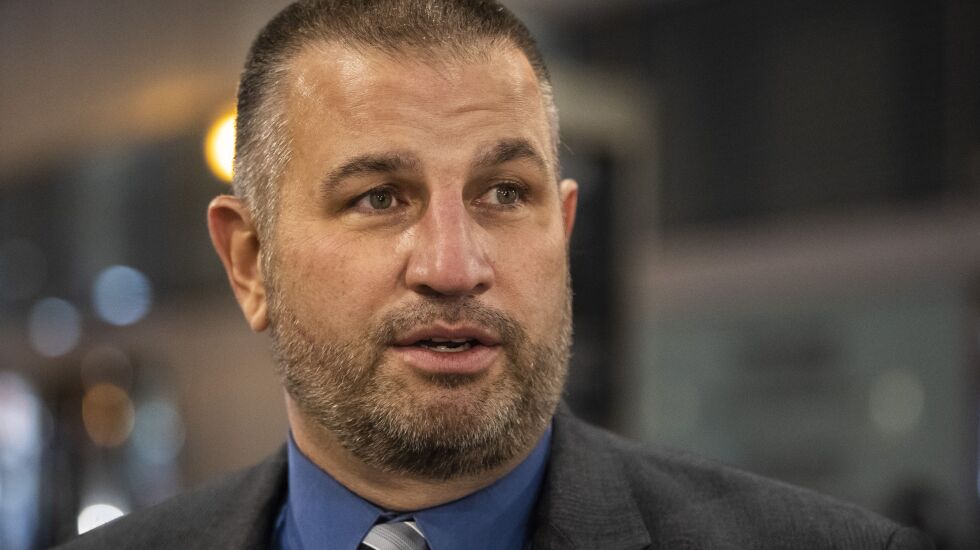
Before we call for scrapping the arbitration system as a means to resolving Chicago Police Department disciplinary matters, to ensure transparency and accountability, perhaps we can shed a little light on why arbitration is necessary.
If the Sun-Times’ recent editorial truly advocates raising questions about the arbitration process as it applies to Chicago police, allow me to provide some answers about why we must have this protection.
In response to the editorial, “Laxer punishment given to CPD officers who went into Bobby Rush’s office raises questions about the arbitration process,” I would just like to take a moment to educate those who do not understand what that really means.
Arbitration is granted to all the true essential workers we have in the City of Chicago: police officers and firefighter.
SEND LETTERS TO: letters@suntimes.com. We want to hear from our readers. To be considered for publication, letters must include your full name, your neighborhood or hometown and a phone number for verification purposes. Letters should be a maximum of approximately 375 words.
Every other union has the ability to strike. The Chicago FOP Lodge 7 does not. In exchange, we have the right to go to arbitration. So, when it comes specific to discipline, arbitration is a needed option.
The reality is the recommendations coming out of the Civilian Office of Police Accountability (COPA), and the department’s Internal Affairs section have increased so exponentially that arbitration is the best and fairest option for our members to get a review of the discipline recommendations and see what’s fair.
In case after case after case, with very few exceptions, arbitrators have lowered the discipline recommendation or thrown it out altogether, because of faulty or extremely lengthy investigations. Timeliness has been a major issue. Not only has COPA doubled and tripled penalties, in some cases, it has increased penalties by tenfold compared with similar situations from just five years ago.
The editorial states that “Arbitration likely won’t be axed anytime soon, but it’s time the city at least explore possible alternatives that won’t leave some Chicagoans wondering if officers are ever held fully responsible for their misconduct.” Accountability cannot be achieved without treating our members fairly, and the only real due process we have comes from arbitration.
The Illinois Labor Relations Board just issued a complaint against the city and COPA for that very thing: excessive discipline recommendations and changing the dynamics in which they process discipline complaints. That ruling forces the city to now respond within two weeks to answer a complaint, thanks to the Unfair Labor Practice (ULP) complaint Lodge 7 filed about changes to the discipline process.
We filed the ULP because Lodge 7 noticed the recommendation for cursing at somebody used to be a reprimand or a two-day suspension. But is now 15, 20 or even 30 days suspension.
That’s because the department knows an arbitrator is going to knock it down to a prior range for similar offenses. They want to get on the high end, so they over-inflate it ridiculously and end up with something where they want it to be, something that attempts to show transparency and accountability.
The same mentality led to the excessive discipline issued to officers who were part of the Bobby Rush incident — which was reduced because it was deemed to be unfair and unreasonable.
For whatever reason, our members have been treated differently, and progressively worse, year after year after year. We have never been treated like every other union in this city.
Craig B. Futterman from the University of Chicago Law School’s Civil Rights and Police Accountability Project suggests scrapping the arbitration system for police disciplinary matters because officers have the right to due process through a police board hearing. Obviously, we don’t, as our ULP proved.
So arbitration is the only protection — and the best protection — that our members have. And we will fight to keep it no matter what. If the city or state wishes to give us the ability to strike, we will happily accept it.
John Catanzara, president, Chicago FOP Lodge 7
To fight climate change, get big money out of politics
Chicago is experiencing the worst air quality among 95 cities worldwide as smoke from Canadian wildfires covers our area. This smoke earlier blanketed the east coast, and smoke from western wildfires covered that region.
The poisonous particulate pollution in this smoke contributes to respiratory and cardiac disease, cancer and many more health problems and is responsible for millions of deaths worldwide each year. As climate change gains momentum, wildfires and their harmful effects will worsen, as will storms, floods, hear waves, droughts and crop failures.
Why is the United States not leading the world in an all-out battle against climate change?
Because ultra-wealthy fossil fuel interests continue to pour tens of millions of dollars into political campaigns, mostly to Republicans as they sway that party to block the transition to clean, renewable energy.
To safeguard their profitable private interest, fossil fuel companies are assaulting the public interest.
From tobacco companies to gun, chemical, pharmaceutical, insurance and financial interests, it is the same story: large contributions protecting corporate profits at the expense of ordinary people.
This is a clarion call for getting big money out of politics. Public funding of political campaigns would democratize contributions and make it more difficult for the pursuit of profits to triumph over the public interest.
Richard Barsanti, Western Springs







